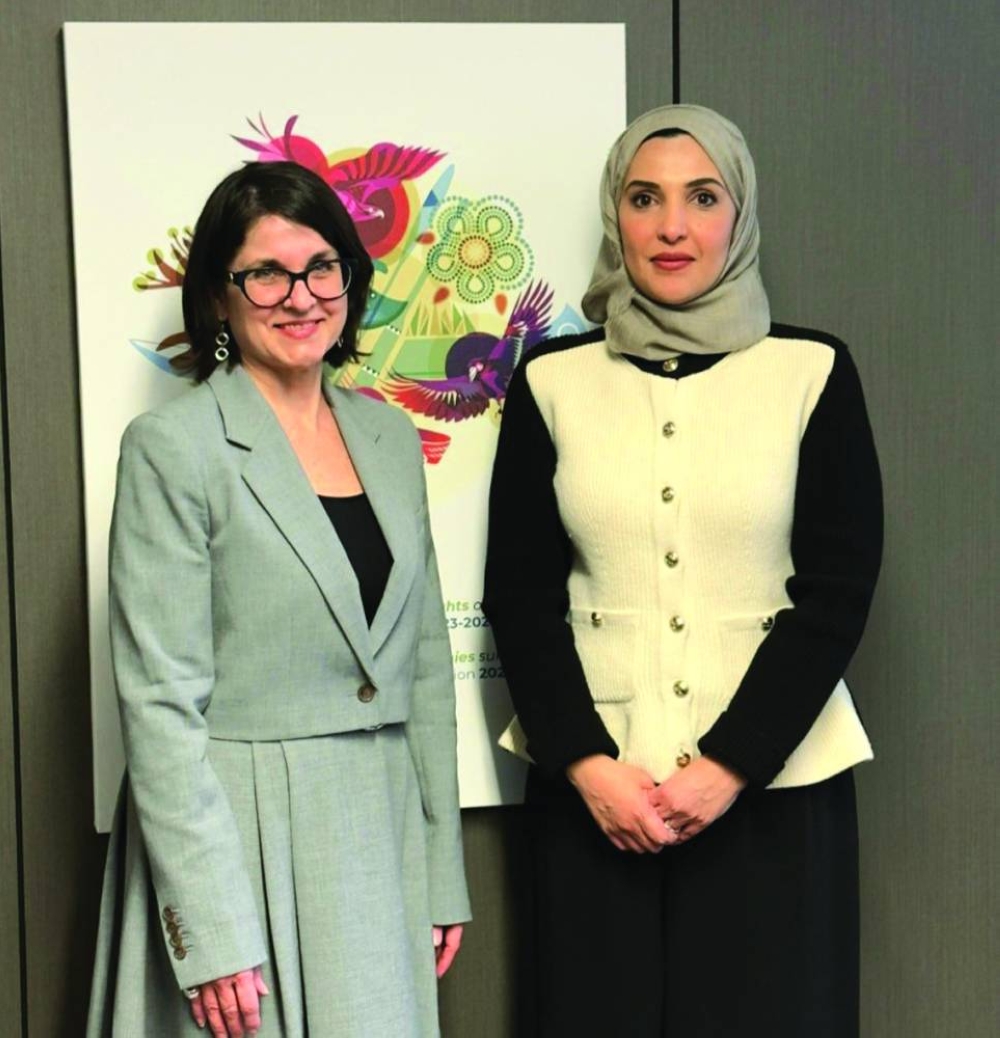Qatar has achieved a breakthrough in achieving full equality in education, health, and employment, said HE National Human Rights Committee (NHRC) Chairperson Maryam bint Abdullah al-Attiyah.
HE al-Attiyah added that Qatari women have been appointed as judges since 2010 and took up positions in the military, civil aviation, and diplomatic corps. This is in addition to the State's extensive efforts to protect workers' rights and its achievement of equality and social justice through the rapid legislative reforms and developments made to the Qatari Labour Law over the past years.
This came during two separate meetings held by HE al-Attiyah in Ottawa, with Canadian Human Rights Tribunal’s Vice-Chairperson Athanasios Hadjis, and with Deputy Minister of Women and Gender Equality and Youth Frances McRae.
During her meeting with Hadjis, HE al-Attiyah noted that the committee is one of the key national institutions in the region, having been classified as an "A" by the Sub-Committee on Accreditation (SCA) of the Global Alliance of National Human Rights Institutions (GANHRI) since 2010, in accordance with the Paris Principles.
She explained that the NHRC has formed a permanent working group dedicated to promoting a culture of human rights, in addition to its role in making recommendations to the State regarding its accession to international agreements and reviewing relevant legislation.
HE al-Attiyah emphasised the committee's commitment to integrating human rights concepts into school curricula, noting that it continues its efforts to strengthen its regional role by supporting the establishment of similar national institutions in a number of Arab countries.
She stressed that Qatar has undertaken significant reforms to protect and promote workers' rights, highlighting NHRC's important role of providing advisory recommendations to relevant government agencies, receiving worker petitions and assisting them in finding solutions in co-operation with relevant authorities, as well as raising workers' awareness of their rights through campaigns, training courses, and other awareness-raising activities.
She reviewed key legislative developments in Qatari labour law over the past years, noting that the law regulating the entry and exit of expatriates grants workers the right to transfer to another employer. This allows the employer to loan workers to another employer for a period not exceeding six months, renewable for a similar period. The law also allows expatriates to work part-time for another employer in addition to their original work, after obtaining the employer's approval.
She pointed out that the amendment includes exemption from exit permits for all employees of companies and institutions subject to the labour law, granting them the right to leave the country at any time during the validity of their employment contract.
The NHRC chairperson explained that the establishment of the Labour Disputes Settlement Committee, which is responsible for resolving individual disputes arising from the application of the provisions of the Labour Law or the employment contract, has reduced the burden on the courts, improved the right to litigation, and strengthened the protection of workers' rights.
She noted that the state has exempted workers from paying any fees related to labour lawsuits, noting that the establishment of the Workers' Support and Insurance Fund has provided the necessary protection for workers and enabled them to receive their financial dues without having to wait for their employers to provide them with payment in the event of payment difficulties.
HE al-Attiyah said that the Wage Protection System (WPS) — a comprehensive electronic platform — was introduced through an initiative by the Ministry of Labour and Qatar Central Bank. The system aims to regulate and document the payment of workers' wages across institutions, ensuring that employers consistently pay salaries on time.
She also highlighted one of the key legislative developments: the summer working hours regulation for outdoor and exposed workplaces. The decision mandates that, between June 1 and September 15 each year, work under direct sunlight or in open areas is prohibited from 10am to 3:30pm, protecting workers from extreme heat.
As part of the NHRC's educational and support role, HE al-Attiyah noted the release of ''Worker's Pocket Guide’'' in 11 commonly spoken languages among Qatar's labour force. The guide outlines rights and responsibilities of those seeking work in Qatar, designed to be accessible to all knowledge levels. She also pointed out that the NHRC offers free legal consultations to workers in collaboration with around 30 law firms across the country.
On the Canadian side, Hadjis gave an overview of the tribunal's independent role, separate from regular court system, which focuses on cases of racial discrimination.
He also underlined the tribunal's broad legal authority, which includes issuing binding decisions and awarding compensation to victims.
In her meeting with McRae, HE al-Attiyah highlighted Qatar's significant progress toward full gender equality. She noted that women in Qatar have equal access to social security, housing services, and educational opportunities, and benefit from flexible work arrangements, paid maternity leave, breastfeeding breaks, and childcare support.
She also stressed that Qatar provides a comprehensive healthcare system supporting women through all stages of pregnancy and postnatal care. Qatari women, she added, hold leadership roles across ministries, the diplomatic corps, and the judiciary.
For her part, McRae expressed appreciation for the NHRC's work and discussed with HE al-Attiyah the committee's collaboration with the Ministry of Social Development and Family in promoting family protection awareness.

HE NHRC Chairperson Maryam bint Abdullah al-Attiyah with Canadian Deputy Minister of Women and Gender Equality and Youth Frances McRae.
